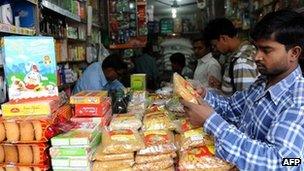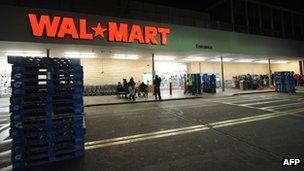India to open market to global supermarket chains
- Published

Opponents say the move will have a drastic effect on smaller retailers
India has approved long-awaited proposals to open up the retail market to global supermarket chains.
Food Minister KV Thomas said the cabinet has agreed to 51% foreign ownership of multi-brand retail stores, allowing groups like Wal-Mart and Tesco to open stores.
Such operators currently can only sell wholesale in India and not directly to customers.
A decision on the issue has been pending for two years.
Mr Thomas told reporters that the cabinet decided to raise the cap on foreign investment in single-brand retailing - such as Apple or Reebok - to 100%, from its current 51%.
"Consumers will have many more choices," said Gibson Vedamani, of the Retailers Association of India. "It will truly be a borderless world in terms of products available."
Supporters of the move say it will increase competition and quality while reducing prices, which have been hit by close to double-digit inflation.
Opponents say the multi-nationals will squeeze out India's smaller and poorer traders and drive down prices paid to India's farmers.
'Completely opposed'
One cabinet ally of the ruling Congress party, Dinesh Trivedi of the Trinamool Congress, said his party was "completely opposed to it".
He said: "My suggestion in the cabinet meeting will be that an all-party meeting should be called to discuss this sensitive matter before taking it up in the cabinet."
The main opposition Bharatiya Janata Party is opposed to the proposal and there have been street protests by traders.
BJP politician Murli Manohar Joshi said the move was "a tool to kill the domestic retail industry".
But Gibson Vedamani, a board member of the Retailers Association of India, told Agence France-Presse: "If this proposal gets through, consumers will have many more choices - it will truly be a borderless world in terms of products available."
Trade Minister Anand Sharma said before the decision that there was "a broad-based consensus" in the cabinet in favour of the proposal.

Giants like Wal-Mart have long eyed the lucrative Indian market
However, some analysts have pointed to the potential political fallout and say there may be another move to postpone any decision.
The multi-nationals have long been eyeing the lucrative Indian market.
Tesco, for example, welcomed the decision.
"Allowing foreign direct investment in retail would be good news for Indian consumers and businesses and we await further details on any conditions," the company said.
"We already have a franchise arrangement with Tata's Star Bazaar stores. Learning about India and serving more customers every month is a win-win for customers, suppliers, Tesco and Tata."
Any easing of regulations could eventually come with strict controls, for example on local sourcing and levels of investment.
- Published24 November 2011
- Published18 October 2011